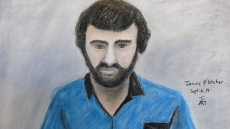TORONTO — A new study suggests the number of Canadians living with stroke-induced disabilities will rise substantially over the next couple of decades.
More people are surviving strokes — a good news story about what can be a devastating and even fatal attack on the brain.
But the study authors say that with an aging and expanding population, this country will face a significant increase in the number of people who need stroke rehabilitation and other forms of post-stroke support.
The study estimates that there were about 405,000 people living with a stroke disability in this country in 2013 — nearly 30 per cent more than was previously estimated.
And it says that number could increase to between 654,000 and 726,000 by 2038.
Dr. Mark Bayley, who is one of the authors, says more research is needed to find ways to help people overcome or cope with the after-effects of stroke.
"The good news is that more people are surviving their stroke," says Bayley, the medical director of the brain and spinal cord rehabilitation program at the Toronto Rehab Institute.
"And therefore we're concerned that we need to be ready for how those people are going to need to be supported and also cared for and how we can optimize their quality of life while they're recovering from their stroke or after their stroke."

The study was published Thursday in the journal Stroke. It was funded by the Heart and Stroke Foundation Canadian Partnership for Stroke Recovery.
There are two major types of strokes. Hemorrhagic strokes occur when a blood vessel in the brain breaks open or leaks blood, putting pressure on nearby brain tissue. The more common ischemic strokes are caused by a blockage in an artery that supplies oxygenated blood to the brain.
For the latter, drugs that break up clots can restore blood flow to the brain and minimize the damage, but they must be given within a few hours of the stroke to have benefit.
It's estimated that about 36 per cent of people who survive a stroke will still have significant disabilities five years after the event. Those can include problems with mobility, speech and brain functioning.
Bayley says the 36 per cent figure is probably low because it may not capture people who are living with the more subtle effects of what are known as mini-strokes or TIAs — transient ischemic attacks. The blockages that cause TIAs are short-lived and not as devastating as a full stroke. But damage can accrue over time.
Previously it had been estimated that about 315,000 Canadians are living with after-effects of a stroke. But Bayley and his co-authors believed that number was out of date.
It was arrived at using data from the Canadian Community Health Survey, which is conducted by Statistics Canada. But the survey does not collect information on children under the age of 12, a population in which strokes, though rare, do occur. And it doesn't include data on people living in long-term care facilities, a demographic at high risk of experiencing strokes.
So the researchers recalculated to include those overlooked groups, coming up with the higher figure.
Bayley suggests the need for health services to help stroke victims recover and function is an issue of serious public health concern.
"We think that research is crucial and that investment in research into living with the effects of stroke are really critical at this time," he says.

"The problem is that access to rehabilitation, both as an early inpatient and as a later person living in the community, is highly variable in Canada. And some people, unfortunately, do not get access to the best practice."





